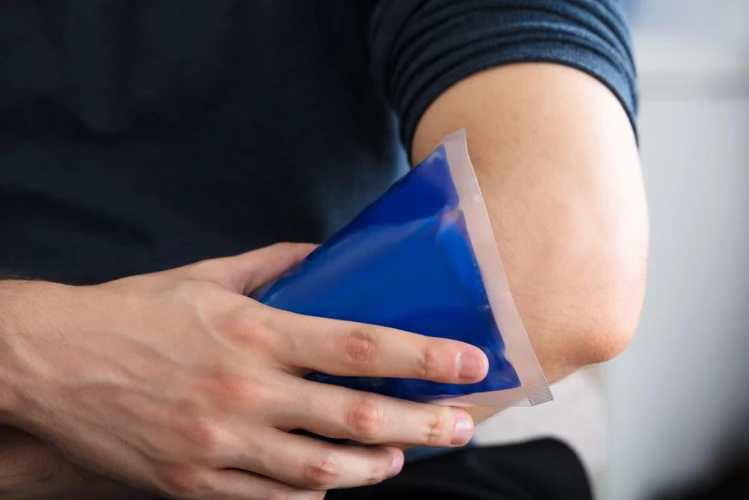The fear of venomous spiders plagues many people, and rightfully so, as their bites can be quite dangerous. Among them, the black widow spider is one of the most notorious. While they may be typically found in the southern parts of the United States, black widows can be present in various locations around the world. Being bitten by one of these spiders can be a cause for concern, as their venom can lead to serious complications, especially if left untreated. However, taking necessary steps after being bitten can help reduce any harm that may result. In this article, we’ll provide you with the steps to take after a black widow spider bite, so that you can feel equipped to handle the situation should you ever find yourself in this unfortunate circumstance.
Identify the Bite
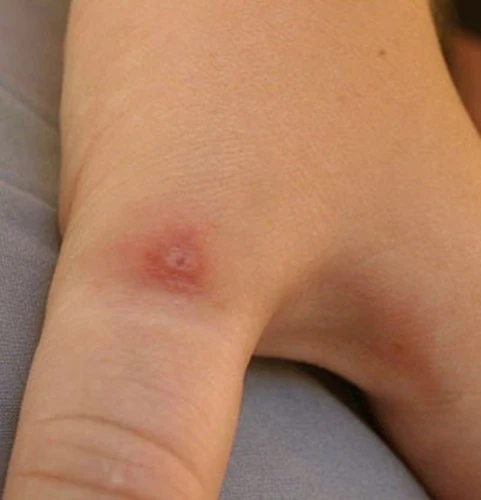
Identifying the Bite: One of the first steps after a black widow spider bite is identifying the bite itself. This is crucial for determining the appropriate treatment. If you’re unsure whether you’ve been bitten by a black widow spider, consider looking for specific symptoms or signs of the bite. In the following sections, we’ll take a closer look at what a black widow spider bite may look like, and what symptoms you should be aware of. If you have identified the bite, seeking medical attention is the next step to take. For more information on medical treatment for a black widow spider bite, visit our page on what to expect from medical treatment.
What Does a Black Widow Spider Bite Look Like?
A black widow spider bite can be hard to identify because it doesn’t always result in a visible bite mark. However, if a bite does leave a mark, it typically looks like two small puncture wounds that are close together. The bite area may also appear swollen, red, or itchy. In some cases, a rash may develop around the bite site.
It’s important to note that not all black widow spider bites result in the classic “two dots” mark. In fact, some bites can cause no outward signs at all. It’s important to be aware of other symptoms that may indicate a black widow spider bite.
Some symptoms to look out for include:
- Intense pain around the bite area. The pain may come and go, but it can be severe.
- Abdominal cramping, which can be mistaken for appendicitis or other digestive issues.
- Sweating and chills.
- Nausea and vomiting.
- Muscle spasms or twitches.
- Difficulty breathing or swallowing, in severe cases.
It’s crucial to seek medical attention if you experience any of these symptoms after being bitten by a black widow spider. A medical professional can properly diagnose and treat the bite to prevent any serious complications.
If you suspect that you’ve been bitten by a black widow spider, it’s important to avoid any home remedies or medical treatment without consulting a doctor first. Some remedies, such as applying heat to the bite area, can actually worsen the symptoms and lead to further complications.
For more information on the symptoms and treatment of black widow spider bites, check out our article on symptoms of a black widow spider bite.
Symptoms of a Black Widow Spider Bite
A black widow spider bite can be quite alarming as it can cause intense pain and discomfort, which varies from person to person. Common symptoms of a black widow spider bite include:
- Sharp and painful two puncture wounds at the site of the bite
- Redness and swelling
- Severe muscle cramps and spasms that typically start around the bite and then spread to other parts of the body
- Abdominal cramping, muscle rigidity, and severe back pain
- Sweating, chills, and fever
- Headache
- Nausea and vomiting
- Difficulty breathing or swallowing
- Increased blood pressure and heart rate
It’s important to note that not all individuals who are bitten by a black widow spider will exhibit these symptoms, and the symptoms may be milder in some cases. However, most people who are bitten by a black widow spider will experience some pain and discomfort.
If you have been bitten by a black widow spider and are experiencing any of the above symptoms, it’s important to seek medical attention right away. Delaying medical treatment can lead to complications and make the recovery process longer and more difficult. In the next section, we will discuss in more detail why it is important to see a doctor and what you can expect from medical treatment.
Remember: It’s essential to take preventative measures to avoid another black widow spider bite. Check out our article on preventing future black widow spider bites for more information.
Seek Medical Attention
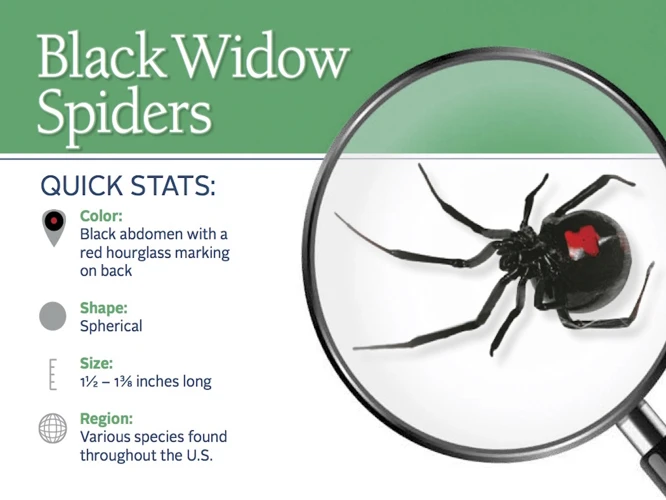
Seeking medical attention is crucial after a black widow spider bite. Black widow bites are venomous and can cause serious symptoms that require professional medical treatment. It’s important to act fast and not delay seeking medical care. While some bites may not require medical attention, it’s best to err on the side of caution. In the next sections, we will explore why seeking medical treatment is necessary and what you can expect from it.
Why You Should See a Doctor
Seeking immediate medical attention is critical after a black widow spider bite, as the venom can have severe effects on the body. Without proper treatment, symptoms can worsen and even become life-threatening. It is essential to seek medical attention promptly to avoid complications. The following reasons highlight the importance of seeing a doctor after a black widow spider bite:
| Reasons to See a Doctor After a Black Widow Spider Bite: |
| 1. Antidote Administration: A doctor can administer specific antidotes to counteract the venom’s harmful effects, reducing pain and other symptoms. |
| 2. Prevent Complications: Complications can occur if left untreated. A doctor can monitor the patient’s condition, ensuring they receive proper treatment to prevent such issues. |
| 3. Medical Monitoring: Spider bites can cause significant changes in the body. Medical monitoring can detect any significant changes in vital signs, such as heart rate, temperature, and blood pressure. |
| 4. Avoid Self-Medication: Some people may try to self-medicate with home remedies or unproven treatments. However, this can be dangerous as black widow venom is potent, and self-medication can lead to more severe complications. |
| 5. Faster Pain Relief: Doctors can provide stronger pain relief than over-the-counter medications. Prescription pain medications are often required to manage pain effectively. |
Remember, a black widow spider bite is a medical emergency, and seeking out proper medical attention is the best course of action. Neglecting to get treatment could lead to severe complications, hospitalization, or even death. It is essential not to ignore the symptoms and seek immediate medical attention if you are bitten.
For more information on managing pain after a black widow spider bite, check out our article on black widow spider bite pain management.
What to Expect from Medical Treatment
When you seek medical attention for a black widow spider bite, there are several treatments that may be administered. The specific treatment will depend on the severity of the bite and the symptoms that you are experiencing. Here is what you can expect from medical treatment for a black widow spider bite:
- Pain relief: Pain relief is the priority for black widow spider bite treatments. The doctor may prescribe pain medication or recommend over-the-counter medication to manage pain.
- Antivenom: The doctor may administer antivenom if the symptoms are severe. Antivenom is a medication that can neutralize the venom of the black widow spider and relieve symptoms like muscle cramps, abdominal pain and spasms.
- IV fluids: If you are dehydrated as a result of the spider bite, the doctor may give you IV fluids to help you stay hydrated and flush the toxin out of your system.
- Observation: If the doctor believes that your black widow spider bite is not severe, then they may observe you for a period of time to ensure that your symptoms are not worsening and that you are not experiencing an allergic reaction or other complications.
It is important to know that recovery time can vary from patient to patient. In most cases, patients will begin to experience symptom relief within 24-48 hours. Recovery can take longer for patients who had a severe bite or who have underlying medical conditions. To learn more about black widow spider bite recovery, click on this helpful article. Keep in mind that there are emerging treatments for black widow spider bites that may become available to patients in the future, check out this helpful article to learn more. It’s also important to remember that children and adults may require different treatment plans after a black widow spider bite, read our guide on managing spider bites for more information. Additionally, there are non-medical ways to alleviate pain after a black widow spider bite, and you can read more about them in our article about avoiding pain medication for black widow spider bites.
First Aid Measures
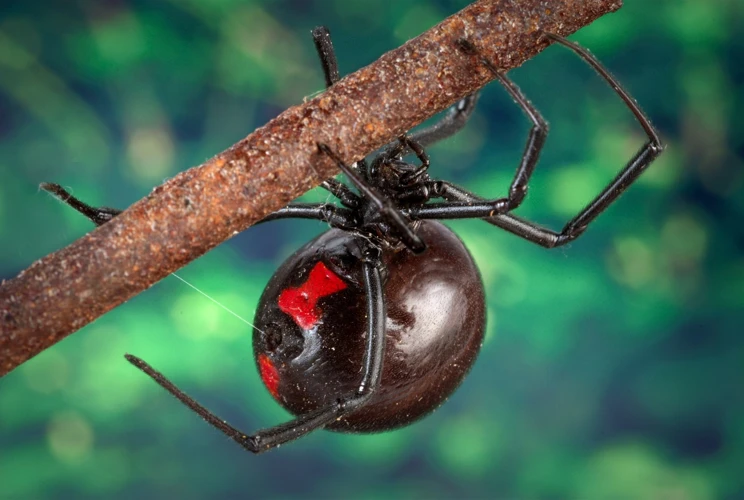
Finding yourself in a situation where you have been bitten by a black widow spider can be a jarring experience. It’s important to take action immediately if you suspect that you have been bitten. One of the first things you should do is administer first aid measures to help reduce the severity of the symptoms. These steps can help alleviate the pain and discomfort associated with the bite and prevent the condition from getting worse. Let’s take a closer look at the steps you should take for first aid after a black widow spider bite.
Wash the Bite Area
After being bitten by a black widow spider, the first step you need to take is to clean the affected area. This will minimize the risk of infection and reduce the severity of the bite’s symptoms. To do this, you should follow these steps:
- Use warm water and soap: Gently wash the area around the bite with warm water and soap. Be sure to clean the entire area, including any surrounding skin. This will remove any dirt, debris, or venom that may be on the skin’s surface. Do not use hot water or scrub the area vigorously, as this can exacerbate the bite’s symptoms.
- Rinse thoroughly: After washing the bite area, rinse it thoroughly with clean water. Make sure that there is no soap left on the skin.
- Apply an antiseptic: Once the bite area is clean and dry, apply an antiseptic such as hydrogen peroxide or rubbing alcohol. This will help kill any bacteria that may be present and prevent infection.
It’s important to note that washing the bite area alone is not enough to treat a black widow spider bite. Seeking medical attention and taking pain management measures are also crucial steps towards recovery. For more information on what to do after a black widow spider bite, check out our article on steps to take after a black widow spider bite.
If you’d like to know more about specific first aid measures for a black widow spider bite, including the use of a cold compress, be sure to read our article on applying a cold compress after a black widow spider bite.
Apply a Cold Compress
When you are dealing with a black widow spider bite, applying a cold compress to the affected area can provide some relief. Here are the steps to properly apply a cold compress:
- Wrap a few ice cubes in a clean cloth or other piece of fabric.
- Place the cold compress gently over the bite area and hold it there for approximately 10 minutes.
- Remove the cold compress for 10 minutes and then reapply it for another 10 minutes.
- Repeat this process every hour or as needed for the first 24 hours after the bite.
Remember to be gentle when applying pressure to the bite site. Applying too much pressure can lead to additional pain and discomfort.
It’s important to note that you should never apply ice directly to the skin as this can cause tissue damage. Always wrap the ice in cloth or fabric before placing it on the skin.
Using a cold compress is just one of the many steps you can take to manage the pain and symptoms associated with a black widow spider bite. Remember to seek medical attention if you suspect you have been bitten and to take preventive measures to avoid future black widow spider encounters.
Elevate the Affected Limb
To help reduce swelling and pain, it’s important to elevate the affected limb after a black widow spider bite. Elevating the limb helps to increase blood flow away from the bite area, which can reduce the amount of venom and alleviate symptoms. Here are some steps you can follow to properly elevate the affected limb:
| Step 1: | Find a comfortable place to sit or lie down. |
| Step 2: | Slowly and carefully raise the affected limb above the level of your heart. |
| Step 3: | Support the limb with pillows or other soft objects to keep it in an elevated position. |
| Step 4: | Rest and keep the limb elevated for at least 30 minutes to an hour. |
Remember to avoid any excessive movement or activity during this time, as it can increase swelling and pain. If you experience any numbness or tingling in the limb, or if the swelling and pain worsens, seek medical attention immediately.
Pain Management
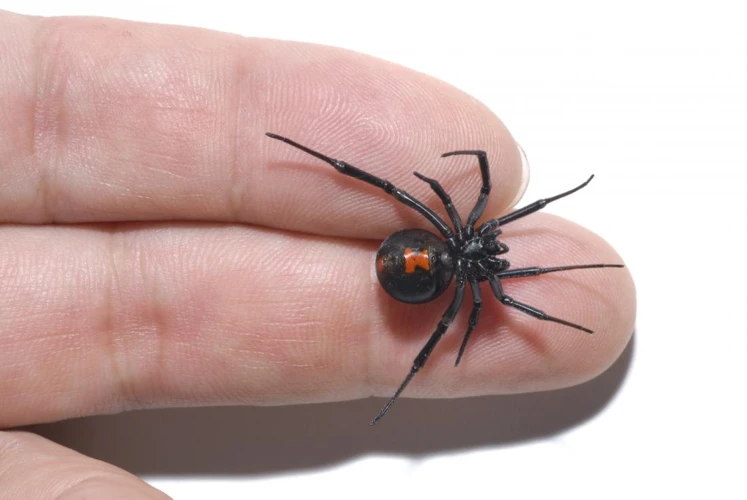
Dealing with the pain and discomfort caused by a black widow spider bite can be a challenging experience. The venom injected into the body can cause significant pain that may last for several days. Finding effective pain management techniques is essential to help alleviate this discomfort, allowing you to focus on the healing process. There are various pain management options available, ranging from over-the-counter medications to non-medical pain management techniques. Let’s take a closer look at some of these options to help you manage the pain caused by a black widow spider bite.
Over-the-Counter Pain Medication
When managing pain from a black widow spider bite, there are several over-the-counter pain medications that can be used. These medications include:
- Acetaminophen: This pain reliever is effective at reducing pain and fever. However, it does not have anti-inflammatory properties, so it may not be the best choice if there is significant swelling around the bite area.
- Nonsteroidal Anti-Inflammatory Drugs (NSAIDs): NSAIDs such as ibuprofen and naproxen are effective at reducing pain and inflammation. They should be taken with food and not used for long periods of time.
- Topical Analgesics: Creams and ointments that contain lidocaine or prilocaine can be applied directly to the bite area to relieve pain. These medications numb the area and provide temporary relief.
It’s important to follow the recommended dosage instructions on the medication packaging and to avoid taking more than the recommended amount. Overdosing on pain medication can cause serious health problems. Additionally, those who are allergic to certain pain medications should avoid taking them and should seek alternative pain management methods.
Keep in mind that over-the-counter pain medications may not provide enough relief for all individuals. If pain persists or is severe, it’s important to talk to a healthcare provider who can prescribe stronger pain medication or recommend alternative pain management techniques.
Use of Prescription Pain Medication
When experiencing severe pain from a black widow spider bite, a doctor may prescribe prescription pain medication to help manage symptoms. These medications are generally only recommended in cases of moderate to severe pain, as over-the-counter options may not provide enough relief.
The following table outlines some of the most commonly prescribed pain medications for black widow spider bites:
| Medication | Drug Class | How It Works | Possible Side Effects |
|---|---|---|---|
| Morphine | Opioid Analgesic | Binds to opioid receptors in the brain and spinal cord to block pain signals | Nausea, vomiting, constipation, dizziness, sedation, respiratory depression |
| Hydromorphone | Opioid Analgesic | Similar mechanism of action to morphine, but more potent | Nausea, vomiting, constipation, dizziness, sedation, respiratory depression |
| Oxycodone | Opioid Analgesic | Blocks pain signals in the brain and spinal cord | Nausea, vomiting, constipation, dizziness, sedation, respiratory depression |
| Tramadol | Central Analgesic | Blocks pain signals in the brain and spinal cord, and increases levels of serotonin and norepinephrine | Nausea, vomiting, constipation, dizziness, sedation, respiratory depression |
It is important to note that these medications carry a risk of addiction and other side effects, and should only be used as prescribed by a doctor. Close monitoring by a healthcare professional may be necessary to ensure safe use.
Before taking prescription pain medication, patients should inform their doctor of any medications they are currently taking, as well as any medical conditions they have. Some medications and conditions can increase the risk of side effects or interactions with pain medication.
In addition to prescription pain medication, patients may also benefit from non-medical pain management techniques such as relaxation exercises and physical therapy. A doctor can provide guidance on the most appropriate approach for each patient’s individual needs.
Non-Medical Pain Management Techniques
When it comes to pain management after a black widow spider bite, there are non-medical techniques that can be used alongside medication to help alleviate discomfort. These methods include:
| METHOD | DESCRIPTION |
|---|---|
| Deep breathing exercises | Practicing deep breathing techniques, such as inhaling deeply through the nose and exhaling slowly through the mouth, can help to relax the body and ease tension caused by pain. |
| Relaxation techniques | Relaxation techniques, such as meditation, guided imagery, or progressive muscle relaxation, can also help to reduce stress and tension in the body, which can in turn help to alleviate pain. |
| Heat therapy | Applying heat to the affected area, such as with a warm compress or heating pad, can help to increase blood flow and reduce muscle tension, which can help to ease pain and discomfort. |
| Massage therapy | Massaging the affected area can also help to increase blood flow and reduce tension in the muscles, which can help to alleviate pain and discomfort. |
| Distraction techniques | Engaging in activities that can take one’s mind off of the pain, such as watching a movie or listening to music, can also be helpful in managing pain. |
| Aromatherapy | Using essential oils, such as lavender or peppermint, can help to relax the body and ease discomfort. These oils can be applied directly to the skin or used in a diffuser. |
It’s important to note that while non-medical pain management techniques can be helpful in managing pain, they should not be used as a substitute for medical treatment. It’s always best to consult a doctor or healthcare professional before using any non-medical pain relief methods.
Preventing Future Black Widow Spider Bites
Now that you’ve taken steps to treat a black widow spider bite, it’s important to think about how you can prevent getting bitten in the future. These spiders are found throughout North America, so it’s crucial to take precautions to avoid them. With some simple strategies and expert help if needed, you can significantly reduce your risk of a black widow spider bite. In this section, we’ll explore effective ways to prevent future bites. Whether you’re an outdoor enthusiast, avid gardener, or simply want to protect yourself and your loved ones from the dangers of these spiders, the following tips can help you stay safe.
Spider Prevention Tips
Spider Prevention Tips
- Keep your home clean – Black widow spiders are attracted to cluttered, messy spaces. Keep your living areas tidy and free of debris.
- Seal your home – Use caulk to seal any cracks or gaps in your walls, foundation, or windows. This will keep spiders and other pests from entering your home.
- Reduce outdoor lighting – Black widow spiders (as well as other insects) are drawn to bright lights, so consider reducing outdoor lighting or using yellow bulbs instead.
- Don’t leave clothing on the floor – Black widow spiders like to hide in fabric, so make sure to hang up your clothes and keep your floors clear of any laundry.
- Use spider repellent – There are a variety of sprays and repellents on the market that are specifically designed to keep spiders away. Apply these products to areas where spiders are likely to enter your home.
- Keep food sealed – Spiders are attracted to food, so make sure to keep all food in sealed containers to prevent spiders and other pests from being lured into your home.
- Regularly inspect your home – Perform regular inspections of your home to make sure there are no spiderwebs or other signs of spider infestation.
- Get rid of clutter – Clear away excessive items from your home, as black widows love to hide in cluttered spaces.
- Trim your landscaping – Black widow spiders love to hide in dense landscaping. Trim back bushes, shrubs, and trees so that they are not touching your home.
- Call an exterminator – If you suspect a spider infestation, call an exterminator to come out and inspect your home. A professional can help you identify areas of concern and offer solutions to prevent future infestations.
By taking these preventative measures, you can greatly reduce your chances of getting bitten by a black widow spider. Remember to stay aware of your surroundings and take steps to protect yourself and your family from these potentially dangerous arachnids.
Expert Spider Removal Services
If you’re concerned about the presence of black widow spiders in your environment, it’s important to take steps to prevent bites from occurring in the first place. One way to do this is by enlisting the help of expert spider removal services. These professionals have the training and experience to identify black widow spider infestations and safely remove them from your home or outdoor space.
Spider removal services typically involve a comprehensive inspection of your property to identify areas where spiders may be hiding or nesting. These areas may include dark, damp corners, crawl spaces, and other rarely visited parts of your home or outdoor environment. Once the areas have been identified, specialists will use specially designed tools and techniques to safely and effectively remove the spiders and their webs.
Some spider removal services also offer ongoing spider prevention measures, which may include sealing cracks and crevices, removing clutter and debris, and using insecticides and other treatments to discourage spiders from making your property their home.
If you’re considering enlisting the services of professional spider removal experts, it’s important to do your research and choose a reputable, licensed provider. Be sure to read reviews and ask for references from past customers to ensure that you’re getting the best possible service.
While taking the proper safety measures and treating spider bites promptly can help ease the symptoms of a black widow spider bite, the best way to prevent bites from occurring is by enlisting the help of expert spider removal services. By taking steps to keep spiders at bay, you can help ensure that you and your family stay safe from these potentially dangerous arachnids.
| Benefits of Expert Spider Removal Services | Disadvantages of DIY Spider Removal |
|---|---|
| Training and experience to identify spider infestations | Risk of getting bitten or causing spiders to scatter |
| Safely removes spiders and webs from your property | Ineffective treatment methods may result in spiders returning |
| Offers ongoing prevention measures to discourage spider activity | Expense of hiring a professional service |
It’s important to recognize the potential risks of a black widow spider bite and take steps to prevent them from occurring. Enlisting the help of expert spider removal services can be an effective way to keep your property free of spiders and reduce the risk of bites. By carefully considering your options and working with a reputable provider, you can help ensure the safety and well-being of yourself and your loved ones.
Conclusion
In conclusion, a black widow spider bite should not be taken lightly. It’s important to identify the bite and seek medical attention immediately, as the venom can cause serious health complications. First aid measures such as washing the bite area, applying a cold compress, and elevating the affected limb can help in pain management. Over-the-counter or prescription pain medication may also be necessary. However, preventing future black widow spider bites is crucial. This can be done by taking preventive measures such as spider prevention tips and seeking expert spider removal services. With proper awareness and action, it is possible to avoid the threats posed by black widow spiders.
Frequently Asked Questions
What should I do if I get bitten by a black widow spider?
If you have been bitten by a black widow spider, seek medical attention immediately.
How do I identify a black widow spider bite?
A black widow spider bite usually looks like two small red marks, and produces symptoms of pain, cramps, and muscle spasms.
Why do I need to see a doctor if I have been bitten?
A doctor can provide medical treatment to help relieve your pain and manage your symptoms. They can also monitor your condition and ensure that it does not worsen.
What is the medical treatment for a black widow spider bite?
Medical treatment for a black widow spider bite may include medications like pain relievers and muscle relaxants, as well as medications to help control blood pressure and other symptoms. In severe cases, antivenom may also be administered.
Can I manage the pain of a black widow spider bite with over-the-counter medication?
Over-the-counter medication like acetaminophen or ibuprofen can be helpful in managing the pain of a black widow spider bite, but stronger prescription medication may be necessary for severe cases.
What non-medical pain management techniques can I use for a black widow spider bite?
Non-medical techniques for managing the pain of a black widow spider bite may include hot or cold compresses, deep breathing exercises, and relaxation techniques like meditation or yoga.
How can I prevent future black widow spider bites?
Prevent future black widow spider bites by taking steps to eliminate spider habitats around your home, wearing protective clothing and gear when working outside, and using spider repellent products around your home and yard.
What are some spider prevention tips?
Spider prevention tips include eliminating clutter and debris around your home, sealing cracks and gaps in your walls and foundation, and keeping your home clean and free of food and water sources that may attract spiders.
What are expert spider removal services?
Expert spider removal services are professional pest control providers who can help eliminate spider infestations around your home by using specialized products and techniques to get rid of spiders and prevent future infestations.
Are black widow spider bites always dangerous?
Black widow spider bites can be dangerous in some cases, especially if you are allergic or if you are experiencing severe symptoms. It is always a good idea to seek medical attention if you have been bitten by a black widow spider.

